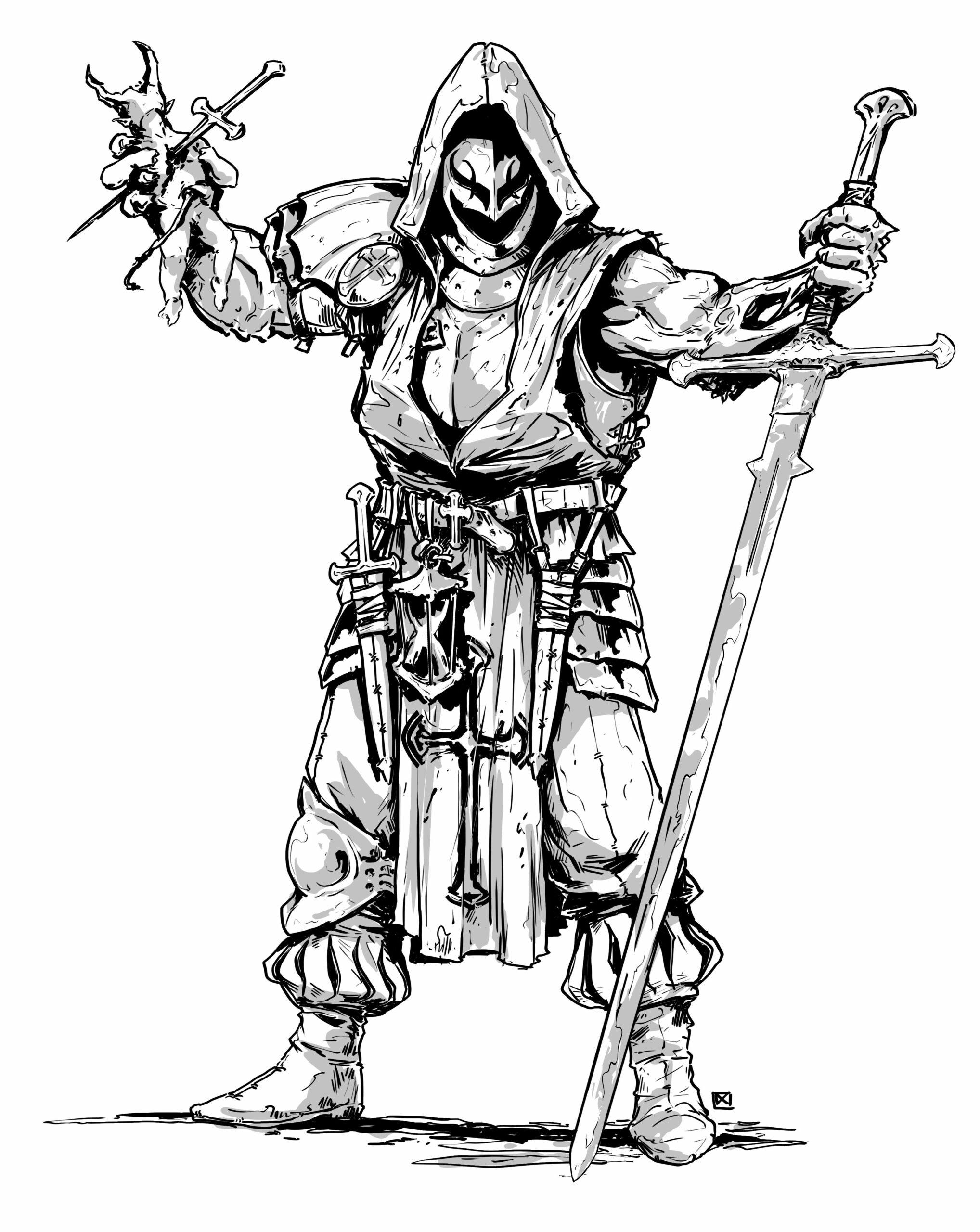
When the Infection began to spread across Europe, the Papal State found itself compelled to reevaluate the structure of the Holy Inquisition. Those afflicted by the plague were often deemed heretics without question, especially if they displayed overt physical mutations or hailed from affluent families:
in the latter case, following their condemnation, their estates would be seized by the Church itself, purportedly for “a nobler cause” (a detail that was routinely and conveniently overlooked by the clergy).
However, problems arose from the fact that infected individuals frequently developed superhuman mental and physical abilities. This made their capture challenging without resorting to violent confrontations, which often resulted in significant losses among the Inquisition’s ranks.
The inquisitorial system in use at the time had lost its purpose.
There was a need to minimize risks, time, and manpower losses, and thus the decision was made to create a special branch of the Inquisition where all phases of the process—from interrogation to public execution—would be conducted by a single individual assuming the roles of accuser, judge, and secular arm.
A military corps was founded, composed of individuals trained in both inquisitional doctrine and the art of war. Furthermore, the Church hypocritically included within this group many individuals heavily altered by the Infection—provided they remained devout to the holy cause.

There was a need to minimize risks, time, and manpower losses, and thus the decision was made to create a special branch of the Inquisition where all phases of the process—from interrogation to public execution—would be conducted by a single individual assuming the roles of accuser, judge, and secular arm.
A military corps was founded, composed of individuals trained in both inquisitional doctrine and the art of war. Furthermore, the Church hypocritically included within this group many individuals heavily altered by the Infection—provided they remained devout to the holy cause.
This cadre of true supersoldiers proved devastating; driven by zealotry and indoctrination, a single one among them could accomplish what scores of ordinary men could not.
Yet there was one among them who stood apart in power and cruelty.
Good and evil, as they say, are subjective concepts, best approached with caution; however, none could deny that this individual, throughout their life, harbored a singular fascination with the suffering of others.
Whispers of unsettling rumors surrounded him always. Some claimed to have known him during the wars, bearing witness to massacres and tortures so heinous that no conflict could excuse them.
Others, imprudently, claimed to have known him during his youth and went so far as to investigate his past more deeply.
And so, memories began to resurface, stories of a cruel child, constantly engaged in tormenting his peers. At that time – they said – he was already bigger and stronger compared to the other boys; still, while not despising bullying and beating, he seemed to prefer psychological torment over physical violence. It seems that he had an incredible talent for discovering the weaknesses of the human soul and then devising twisted plans to poke at them and satisfy himself on the suffering of others.
Growing up, his natural progression led him to the path of war. In an era rife with conflict, the battlefield provided a convenient outlet, socially sanctioned, for his insatiable need to inflict harm. It is said he served with various mercenary bands, cultivating a fearsome reputation even among those hardened souls.
Accounts of torture, mutilation, and wanton slaughter continued unabated during this period; yet gradually, these narratives faded into the broader tapestry of war, his traces lost until he resurfaced among the ranks of the New Inquisition.
In retrospect, his ascension seemed inevitable. Never one for religious fervor—his faith resided solely in himself and his individual power—what better guise to perpetrate carnage against the weak and innocent than under the guise of divine justice?
And so he embraced a compromise: pretending to loyally serve a cause he didn’t believe in, with the sole aim of being able to satisfy his morbid appetites.
However, when knocking on the Church’s doors, something deep inside him had already changed.
Everything started with some strange dreams.
Nightly visitations unfurled bizarre scenarios set against a perpetual twilight backdrop. He revisited his youth, the atrocities of his past, glimpsing a future awash with battles, glory, and dominion…
These crepuscular visions portrayed him enmeshed within a potent organization, subtly goading him toward that trajectory: servant of a deceitful deity in exchange for the grandest opportunity of his life.
Nobody really knows what happened during those dreams.
Maybe the Outsiders, made curious by his psyche whose polar star was a constant search for others’ pain, were lured like moths seeing for the first time a flame burning with a distorted and mysterious color. Perhaps these entities—lacking our human moral compass—satisfied his yearnings, expanding his mind, unintentionally catalyzing a lethal evolution of humanity.
Only one thing is certain for the travelers of the Ambered World: the one rule is to desire, and if you have an obsession… you’ll see it satisfied, at your own risk.
Thus, the Inquisitor came to terms with his past, realizing he had become staggeringly formidable, endowed with preternatural strength, speed, and reflexes. His form metamorphosed into something inscrutable: wounds— even the most grievous—mended within moments, fueling his belief in near-immortality.
He was able to adapt to any adversary, mirroring their abilities and augmenting his arsenal with each encounter. The greater the challenge, the deadlier the clash, the more he reveled in the pursuit of victory.
Foremost, he proved impervious to the mental powers often exhibited by the infected:
this made him the best weapon the Pope could deploy against the Heresiarch – the strongest known psychic.
But it was a double-edged weapon, because not even the pontiff – also endowed with tremendous psychic abilities – was able to control him and, with time, started growing intimidated by his presence: because the Inquisitor, a lethal and increasingly unruly soldier, disregarded orders, committing atrocities even by New Inquisition standards.
Despite this, no significant measures were enacted against him. He remained too invaluable an asset to the Holy See, culminating in the day the Pope summoned him to Rome, entrusting him with the mission that would go down in the annals as “The Hunt for Sanguìnea.”
But that tale is one of length and fate, to be recounted another day.
As for today, the Inquisitor serves the Church and keeps sowing the world with pain: unbeatable as a god among mere men, who can do nothing but feed him with their suffering.
And yet, this story raises a question:
what purpose, if any, serves a life devoted to inflicting harm upon others?
Therein lies an answerless question.
There are rare instances, as the day comes to a close and the Ambered World seems so near and tangible, when even the Inquisitor ponders about the meaning of all things. But such introspections yield naught.
A pawn in life’s grand tapestry, he conforms to the role bestowed by nature: a sadistic entity, condemned—like us all—to succumb to instincts beyond control.
The Inquisitor remains a captive, like every soul, ensnared by impulses against which defiance is futile.
